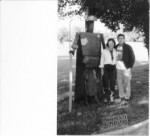Clicking away thousands

In the middle of the afternoon on a bright sunny day, only a glimmer of light exists in a dark lair where hundreds of dollars are being won and lost with the mere click of the mouse. “I’ve been playing poker for about three years,” Nick Louras said with the beaming light of his online poker room of choice flashing in his face. “I started out on Party Poker.Net and that was just a joke because I only played with play money. The real money play started a year ago.”
Louras, a freshman at Castleton State College, is just one among a massive population of youthful online gamblers. The craze began in 2003 following the highly publicized victory of Chris Moneymaker at the World Series of Poker. An accountant from Tennessee, Moneymaker won his seat at the $10,000 main event by winning an online tournament on PokerStars.Net.
The very next year, the field at the World Series more than tripled and the number of online poker rooms multiplied exponentially. The number of college-aged players grew as well.
A recent study by the University of Nevada-Las Vegas found that nearly 40 percent of bets placed online involve college students. The number is attributed to the growing number of online poker rooms and the young people who join them.
Alec White, a senior at Castleton, has been playing online poker for three years.
“Two weeks ago I won $1,000 in a couple of hours,” White said. “The next day I won $400 more. That was a great four hours of my life.”
Louras spoke of his own big winnings.
“It’s not a big deal for me to win a grand in only an hour or two,” he said. “I don’t even really like online poker. I sometimes get cravings for it, so I sit down and try to win some cash.”
Sounds easy, right? But there’s the other side too.
“A couple of nights ago I lost over $1,500,” Louras said. “You win some, you lose some.”
According to a recent article in Time Magazine, a Lehigh University student was so deeply in debt due to his online poker habit that he resorted to robbing a bank last December.
Jeffrey Derevensky, co-director of the McGill University Youth Gambling Research Clinic, estimated that an astonishing five million youths in the United States and Canada have some kind of gambling problem.
Some suggest that the popularity of Internet poker among college students lies in the fact that they are free from the firm restrictions that their parents had imposed on them.
However, some, like Joy Mitchell, Executive Director of the Vermont Council on Problem Gambling, say parents may actually fuel the gambling.
“The parents were so excited that their kids were only playing poker,” Mitchell said. “There’s the rationale that it’s better than drugs and or alcohol.”
Louras noted that he plays right in front of his parents while they are sitting around the dinner table, and that while they do not encourage it, they really don’t mind as long as he doesn’t get into debt.
However, gambling is gambling and addictions can occur.
James Greenough is a senior at Ohio Northern University and recently experienced the dark side of Internet poker.
“I had a friend who started playing a couple of years ago,” Greenough said. “It seemed like everything was fine at first, but within a year he was in so deep that he had lost his life savings and flunked out of school. He’s currently enrolled in Gambler’s Anonymous.”
According to Mitchell, that story isn’t unique.
“Parents call us all the time, concerned that a student hasn’t been showing up for classes and is losing scholarship money,” Mitchell said.
Despite the gambling horror stories that Mitchell sees and hears on a regular basis, there are some who seem to have everything under control.
“Poker is a game that needs to be played with the utmost caution, or it can quickly become a gambling problem,” White said. “For me, school is more important, and poker is more of a hobby.





